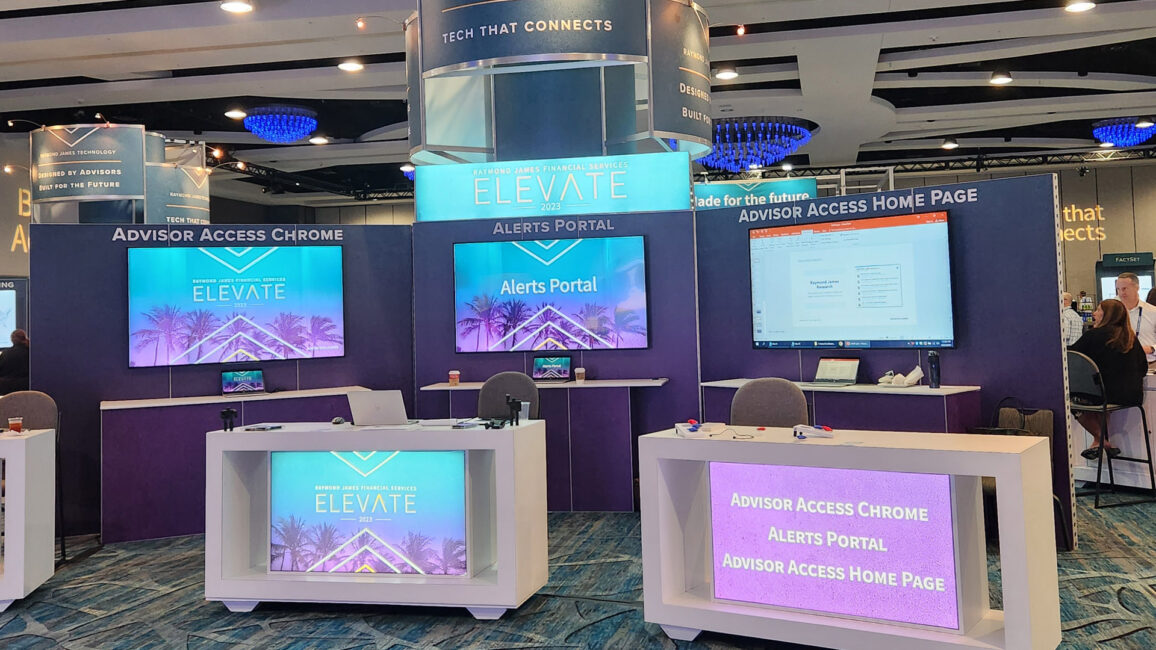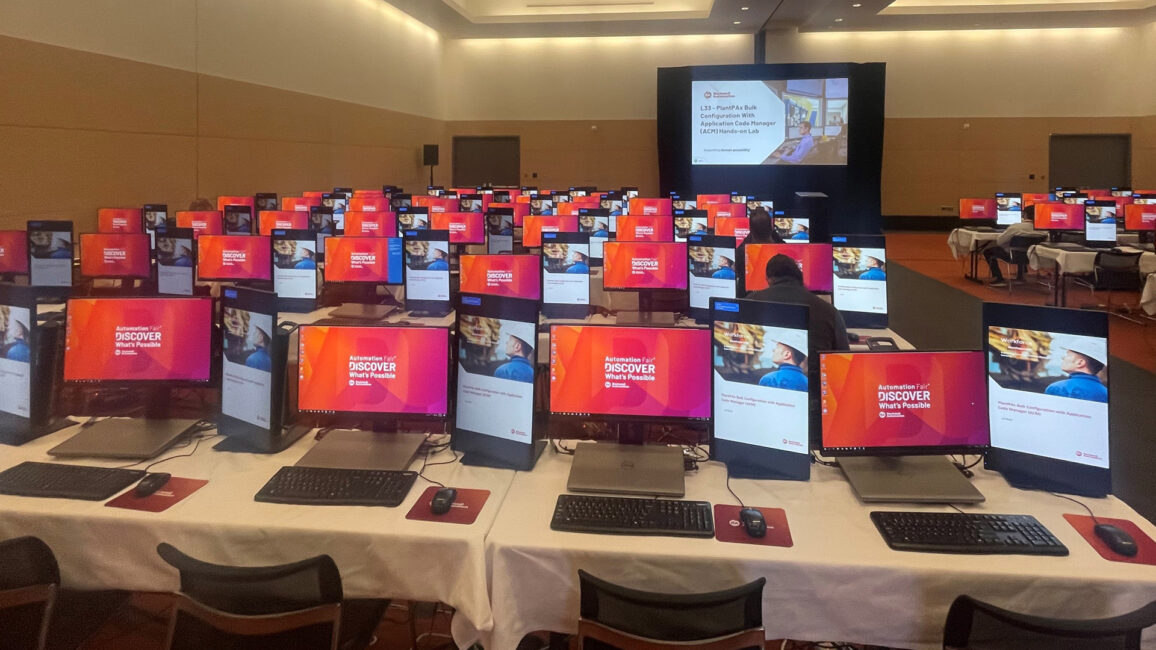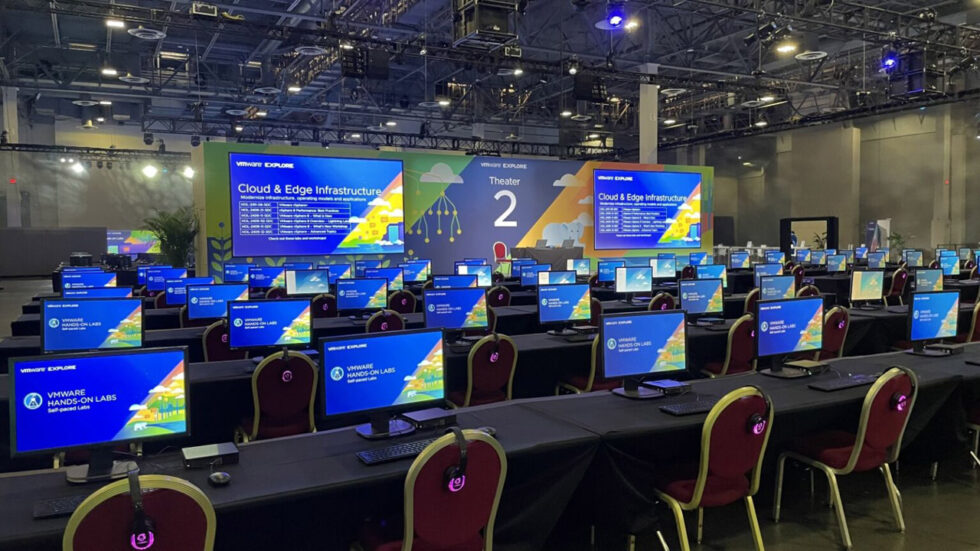In the not-so-distant past, selecting a venue for an event was primarily dictated by four key factors: location, capacity, facilities, and aesthetics.
However, as we continue to advance in the digital age, technology is becoming an increasingly significant player in decision-making for all aspects of delivering an event, with the venue no exception.
This shift is redefining venue selection criteria, expanding it to include considerations such as connectivity, sustainability, and adaptability.
In this blog, we lean into understanding why these tech-centric considerations are becoming crucial for event planners.
Connectivity: A Must-Have in the Digital Age

In a hyper-connected world, reliable and robust Wi-Fi is no longer a luxury but a necessity for any venue, unless you’re planning a remote retreat.
With exhibitors and attendees increasingly relying on their devices for everything from networking and wayfinding to real-time product demos, a strong Wi-Fi connection is critical for a successful event. You’ll also need to be sure your network connectivity is safe and secure for your attendees.
Sessions and breakout rooms require robust connectivity to facilitate live audience polls and interactive Q&As, and even coffee breaks are expected to be digital-friendly and equipped with high-speed internet access so attendees can catch up on emails and, of course, post about the event on social media.
Poor Venue Connectivity Equals a Loss of Revenue
It’s not just about attendee convenience, either. A venue with poor Wi-Fi can lead to a loss of revenue for organizers, as sponsors and exhibitors require reliable internet access to showcase their products and services or to utilize smart technologies such as virtual and augmented reality, live streaming, and interactive displays.
Venues must have the necessary infrastructure to support these features, and as a result, event planners consider the technology capabilities of potential venues to be a key factor in their selection process.
Good Connectivity Means Greater Insight

Aside from providing convenience and revenue opportunities, good venue connectivity also means greater access to valuable data and analytics for event organizers.
With high-speed internet (and other solutions such as beacon technology), event planners can gather real-time information on attendee behavior and engagement. This data can include metrics such as frictionless session attendance, social media engagement, and foot traffic throughout the venue.
By incorporating technology-enabled data collection, event planners can make informed decisions for same-day event changes, improve the overall experience for attendees, and better tailor future events to their needs and interests.
Sustainability: Technology’s Role in Green Events
As society becomes more conscious of its environmental footprint, sustainability has become a significant factor in venue selection.
Venues that use technology to reduce their ecological impact — through energy-efficient lighting, smart thermostats, or digital signage over printed non-recyclable materials, for instance — are increasingly favored.
Technological advancements in event design, such as digital tickets, wallet passes and badges, and virtual agendas, are also helping reduce paper waste.
Event planners can now also consider temporary inflatable structures in locations that would otherwise not be suitable for events to reduce the need for construction and infrastructure development.
Solutions such as Evolution Dome, powered by sustainable sources, allow event planners to reduce the carbon footprint of their events and leave a more positive environmental legacy, perhaps also bringing the “event venue” closer to their target audience and reducing unnecessary travel.
These innovations contribute towards greener events and provide a more streamlined and efficient experience for attendees and venues that align with a company’s corporate social responsibility goals, appealing to eco-conscious attendees.
Adaptability: Embracing the Hybrid Event Trend
The rise of hybrid events — a mix of in-person and virtual participation — has underscored the need for venues to be adaptable. This means having the technological infrastructure to support live streaming, virtual reality experiences, and other digital integrations to connect audiences worldwide.
Venues that cannot accommodate these tech needs may be at a disadvantage in the current event landscape, as even the smallest of events will still have an online community unable to attend in person, hungry to connect, and requiring digital engagement.
With the popularity of hybrid events, venues must be flexible and have the ability to quickly adapt to new technologies as they emerge to stay competitive and meet the evolving expectations of event planners and attendees alike.
This can further validate the effectiveness of your products or services and impress potential customers.
The Case for Tech-Enabled Venue Flexibility

Anyone who’s been working in events for over four years will be well versed in understanding the need to adapt to change quickly, meaning event organizers must be experts in flexibility, and venues have to be able to support changing demands.
The technology that underpins our venues and events must embrace change too, whether in how it interacts with other technologies (integrations) or in new ways users need to interact to provide the ultimate event experience. As event planners explore relatively new and innovative concepts such as hybrid events, pop-up experiences, and temporary structures, adaptability becomes even more apparent.
Technology-enabled solutions can help venues quickly transform spaces to meet changing needs – for example, being able to move session rooms, change layouts, and accommodate last-minute schedule adjustments with real-time updates sent to smart digital signage or mobile apps. This ensures attendees are always well informed and is another example of the need for high-speed connectivity.
With the right technology in place, venues can easily pivot to accommodate any type of event or format, ultimately increasing their appeal and potential for revenue.
Wrapping Up
Technology has undeniably altered the landscape of venue selection, adding layers of complexity but also opportunities for enhanced attendee experiences.
As event planners, staying abreast of changes and understanding how to leverage them in the decision-making process is essential. After all, the ultimate goal remains the same: to create memorable, impactful events that resonate with attendees long after they’ve ended.
Venues that embrace this change and invest in their technological capabilities will be the ones that stand out in an increasingly competitive market.
So, the next time you’re on the hunt for the perfect event venue, remember to look beyond traditional factors and consider how a venue’s tech offerings can elevate event experiences to new levels.
SmartSource® has worked with large and small venues to ensure our clients get the right technology support and expertise to make their events successful. Give us a call to help strategize your next event.

